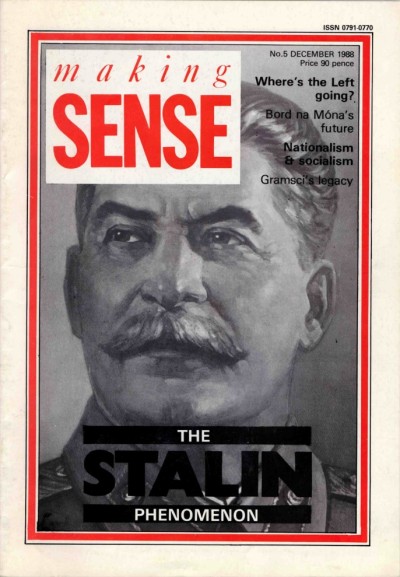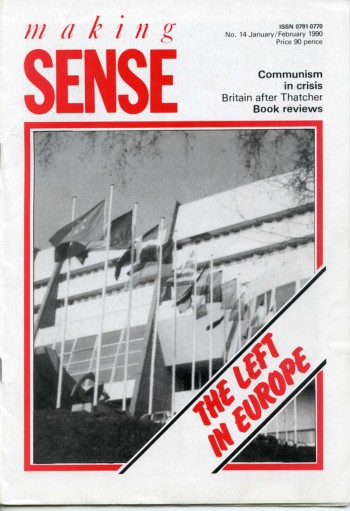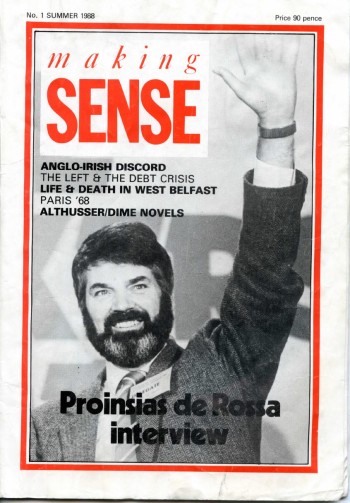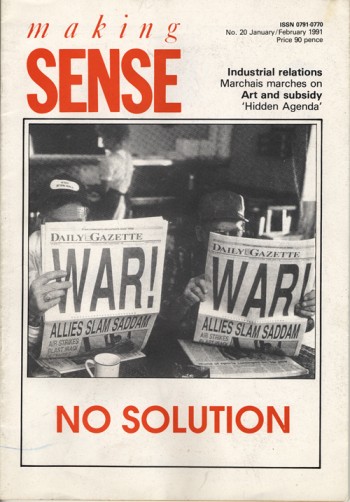Making Sense, No. 5

| Date: | 1988 |
|---|---|
| Organisation: | The Workers' Party |
| Publication: | Making Sense |
| Issue: | Number 5 December 1988 |
Contributors:
Info | Colm Breathnach, Prionsias Breathnach, Lorraine Kennedy, Gabriel Rosenstock, Fearghal Ross, Brendan Ryan |
| Type: | Publication Issue |
| View: | View Document |
| Discuss: | Comments on this document |
| Subjects: |
Please note: The Irish Left Archive is provided as a non-commercial historical resource, open to all, and has reproduced this document as an accessible digital reference. Copyright remains with its original authors. If used on other sites, we would appreciate a link back and reference to The Irish Left Archive, in addition to the original creators. For re-publication, commercial, or other uses, please contact the original owners. If documents provided to The Irish Left Archive have been created for or added to other online archives, please inform us so sources can be credited.
Commentary From The Cedar Lounge Revolution
31st May 2010
This edition of Making Sense, the WP theoretical magazine, dates from December 1988. As such it provides a snapshot of a time of change both within the Workers Party and Soviet Communism. So, despite the image of Stalin on the cover the accompanying article by Dmitry Volkogonov is far from laudatory while pointing to some fundamental issues as regards the position of Stalin within orthodox Communism. Was he aberration, ‘wrong man, but at the right time’, or what? That this article is written by a Soviet insider points to the changes taking place within that state.
Inside there are a variety of articles including one by Proinsias Breathnach on Bórd na Móna which argues that that organisations ‘enterprise-led’ approach is worth considering by the Irish left. Senator Brendan Ryan considers the nature of the Irish Left, Colm Breathnach discusses FMLN in El Salvador. There are a wide range of book reviews, including one Fearhal Ross writing about Gramsci and there is an article by Lorraine Kennedy on the opening of the Lighthouse cinema.
There’s also a most interesting letter from Paddy Woodworth (a member of the party at one time) which asks a number of pertinent questions which point up some contradictory aspects of certain approaches to the conflict on the island during this period, not least:
On the level of ideology, anti-nationalism in Ireland often appears to be anti-green nationalism, since it rarely challenges the adherence of the Orange community to its British nationalism. Something has gone badly wrong with the balance here. If one side can wave its union jacks and poppies, surely the other can wave its tricolours and Easter lilies…
The editorial has a certain contemporary resonance, in this time of ‘reform’. It deals with the Commission on Electoral Boundaries who were given the task of redrawing constituencies and argues that the terms of reference given to the Commission were ‘deliberately designed to distort the proportionality and gerrymander an inbuilt Fianna Fáil majority’. For a small party holding onto an electoral niche such matters are of the utmost importance.
… It can be safely assumed that Fianna Fáil and elements in Fine Gael will not let upon in their efforts to undermine PR (Proportional Representation). By hook or by crook they intend to render it ineffective, and thus copperfasten the right-wing consensus.



![Response: A Stereotyped Picture [Extract from Making Sense, No. 21]](/image/1/350/0/images/covers/ms_21_extract.jpeg)
Comments
No Comments yet.
Add a Comment
Comments can be formatted in Markdown format . Use the toolbar to apply the correct syntax to your comment. The basic formats are:
**Bold text**
Bold text
_Italic text_
Italic text
[A link](http://www.example.com)
A link
You can join this discussion on The Cedar Lounge Revolution
By: Garibaldy Thu, 03 Jun 2010 00:53:42
In reply to Ramzi Nohra 1.
Ramzi,
I’d agree that what we have here is a matter of interpretation, rather than a question where someone can be proven right or wrong.
As for what we have done, or continue to do to break the connection and advance persuasion. You raise the question of our literature. It’s true to see that we don’t plaster it at the top of everything we do the way other parties do. But nor is it something we hide. Just looking at the latest edition of LookLeft, there is a blurb I suppose you would call it on the Party. It talks about building a democratic, secular, socialist Ireland. If you go to the Party’s publication page
http://www.workerspartyireland.net/publications.html
you’ll see the extensive list of publications on republicanism and the republican tradition (and the list is incomplete). Including what was in some ways an update of The Republican Tradition, The Concept of Republicanism, written for the bicentenary of 1798.
Transmitting our understanding of republicanism, and indeed socialism, is a part of trying to break the connection. It’s about persuading people of all religions and none that democratic, secular, socialist politics offer the best way forward for the working class across the island. At the same time, labour mustn’t wait. Class politics continues in both states in every action of the bourgeois parties – we must offer our own version focussed on the here and now as well as the long-term.
You note the Party hasn’t had much success persuading people. I think that’s true of every party that ultimately wants an independent Ireland. I’d be interested though in hearing what it is you think we ought to be doing and aren’t in regards to this question.
Thanks for the mention of that book.
Reply on the CLR
By: Garibaldy Thu, 03 Jun 2010 00:58:32
In reply to yourcousin.
YC,
I’d agree that a lot of nationalism in the period you are talking about was not of the variety that we talk about today. It’s partly why I am cautious about using the phrase for the timeframe under discussion. It elides things that had similarities but also a lot of differences.
I think it’s important not to say that Wolfe Tone or Connolly would have voted this way or that on such and such an Ard Fheis motion, and to that extent I’d agree with you. I’m not someone who thinks digging out a quote from Lenin or Marx or whoever settles an argument set in the here and now. But I think it’s worth thinking about whether such and such a position can be broadly understood as standing within the tradition they were themselves part of.
Reply on the CLR
By: Garibaldy Thu, 03 Jun 2010 01:13:37
Bartholomew,
A big question to which I’m sure this will be an inadequate and ill-thought out answer. But briefly, I think myself that nationalism involves not only the idea that the political and national unit should be congruent, but also that identification with the nation should be one’s primary political identification. I think this conflicts with class politics; I also think that what separates self-determination from nationalism is that it does not rule out the possibility of the uniting with other peoples, whether that involves formal political unity or close cooperation and coordinated action for progressive goals. Nationalism seems to me to rule out the former at least. In Irish terms, I suppose my own view would be that separatism remains a key aspect while there is a need to complete the transition to an independent republic, but once that independence has been achieved, I would have no objection to greater cooperation with others in the right circumstances. Separatism isn’t meant to mean isolationism.
As for whether there is a difference between a people and a nation. I suppose that’s a complex question, relating to language usage as well as conceptualisation. At bottom, I suppose when I use the word people -especially when discussing a country’s internal politics – I mean what used to be called the menu peuple, the popular classes or the lowers orders. The ordinary working people of a country. So when I refer to the rights of peoples to self-determination I suppose I am thinking of the rights of the working people of countries to determine their own future. I think this is what the KKE meant with its slogan, “Peoples of Europe, Rise Up!”
But equally, I probably do sometimes use people when nation would serve the same purpose. It’s something I need to think more about, as this answer doubtless makes clear.
Reply on the CLR
By: Ramzi Nohra Thu, 03 Jun 2010 08:54:04
In reply to Ramzi Nohra 1.
thanks for the response G.
Reply on the CLR
By: Bartholomew Fri, 04 Jun 2010 13:03:35
Thanks Garibaldy. That doesn’t strike me as ill-thought out at all, but very persuasive about identification and self-determination. As for ‘a people’, ‘the people’, ‘a nation’, and now ‘a country’, I’ll have to think hard about those myself too.
Reply on the CLR
By: Gilmore's Travels and his beanstalk economics. - Page 6 Fri, 11 Jun 2010 22:39:57
[…] […]
Reply on the CLR
By: meals online Tue, 20 Jan 2015 22:54:02
Excellent items from you, man. I have be mindful your stuff prior to and you’re
simply extremely fantastic. I really like what you’ve acquired right here, really like what you are stating and the best way through
which you assert it. You are making it entertaining and you still take care of to stay it wise.
I cant wait to read much more from you. This is actually a great website.
Reply on the CLR